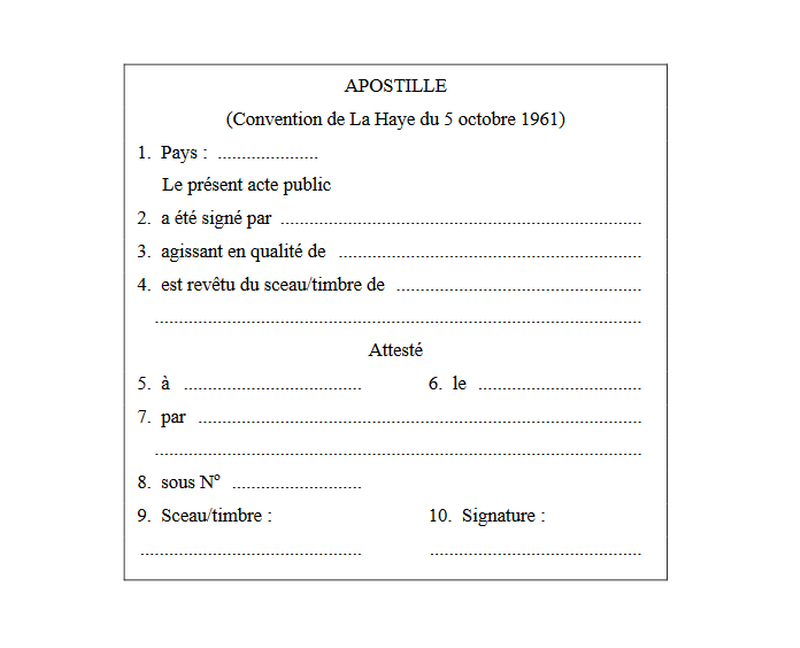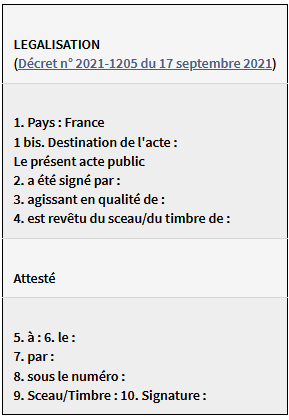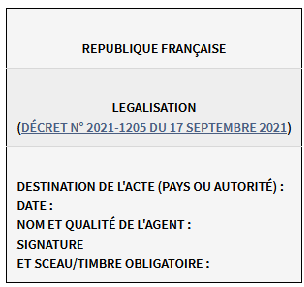Legalization or apostille of a public act drawn up by a French authority
Verified 01 September 2025 - Directorate of Legal and Administrative Information (Prime Minister)
You have a procedure to do abroad and you wonder if your French documents should be legalized or apostillate ? We tell you what you need to know about the procedures for authenticating a signature affixed to a french public document intended to be presented to an authority of a foreigners country.
The notary completes the formalities of the apostille since the 1ermay 2025, and legalization since 1er September 2025.
Warning
The legalization and the apostille do not concern a French document intended for a French administration.
Step-by-step approach
To submit a French document to a foreign authority, the prior authentication of the signature of the authority which issued the document may be required. For example, for an adoption procedure, a judicial procedure, the signing of a contract.
The legalization is there authentication procedure prior to the signature of the issuing authority.
The Apostille is a simplified procedure of legalization. It replaces legalization for the countries where it applies.
Legalization and the Apostille attest to the following information :
- Veracity of the signature of the author of the document
- Quality in which the signatory of the document has acted
- If necessary, identity of seal or stamp which is mentioned on the document.
In practice, legalization and the apostille are a official stamp added to the document.

Apostille Model

Stamp of legalization

Stamp of legalization
The legalization and the apostille concern french public acts intended to be presented to an authority of a foreigner country.
The following documents are considered as public acts :
- Act of a judicial or administrative court. For example, a judgment.
- Act of parquet. For example, a judgment.
- Document drawn up by a clerk. For example, a criminal record extract.
- Act drawn up by a commissioner of justice (formerly judicial officer and judicial auctioneer). For example, a report of findings.
- Civil status document drawn up by a civil status officer. For example, a birth certificate.
- Act drawn up by an administrative authority. For example, a tax assessment, a certificate of social rights, a diploma, a school certificate.
- Notarial deed. For example, an act of notoriety, a power of attorney, a will, a donation.
- Official declaration affixed to a act under private signature. For example, a signature certification, a mention of registration, a visa for a certain date.
Please note
The documents drawn up by a diplomatic and consular agent and the administrative documents relating to a commercial or customs operation (for example, a health certificate) are public acts. However, these acts cannot be apostilled.
One act under private signature cannot be legalized or apostilled as is.
To be legalized or apostilled, a official declaration must be affixed to the documentgiving it the character of a public act.
Examples of official declarations:
- Hardware signature certification
- Record Mention. This may be the registration of the tax service of land advertising with which is deposited a summary slip of deeds in terms of transfer of ownership.
- Visa for certain date. When a public officer puts his visa on the deed under private signature, it acquires certain date. The visa gives the act its character enforceable against third parties.
To be legalized or apostilled, the translation must meet the following conditions:
- The translation must be done by a sworn translator
- The signature of the sworn translator must be certified (signature hardware certification).
The translation must be submitted with the original document.
The rules vary depending on whether the document is to be presented to an authority in a country of the European Union or from another country.
Répondez aux questions successives et les réponses s’afficheront automatiquement
You must present a document to an authority in a European Union country
Austria, Belgium, Bulgaria, Croatia, Cyprus, Czech Republic, Denmark, Estonia, Finland, France, Germany, Greece, Hungary, Ireland, Italy, Lithuania, Latvia, Luxembourg, Malta, Netherlands, Poland, Portugal, Romania, Slovakia, Slovenia, Spain, Sweden
Certain French public documents may be presented without authentication formality to an authority of a country of the European Union. These are the public documents which relate to following domains : birth, being alive (certificate of life), death, name, marriage, including capacity to marry and marital status, divorce, legal separation and annulment of marriage, civil solidarity pact (Civil partnerships), dissolution of Civil partnerships, filiation, adoption, domicile and/or residence, nationality, lack of criminal record.
Consult the e-justice site to know the public documents accepted by the countries European without any authentication formality.
Presentation of a public document in a European Union country: consult the rules by country
Different rules apply to other public documents (e.g. passport, identity document): as appropriate, they are exempt from the authentication formality or must be apostillate. To check the applicable rule, you must consult the summary of rules by country updated by the foreign ministry.
One multilingual form may be attached to certain public documents to avoid having to provide a translation.
You must request the multilingual form from the issuing authority.
However, the receiving authority in the country may request a translation if necessary.
In this case, the translation must be done by a sworn translator.
You must present a document to an authority in another foreigner country
To check whether the document should be legalized, apostilled or is exempt from formality, you should consult the summary of rules by country updated by the foreign ministry.
You can also inquire at the embassy or consulate in France of the country of destination.
Who shall I contact
You have to pay a fee when issuing the apostille or legalized document (if the apostille or legalization is not issued, the fee is not collected). The means of payment you are informed in writing at the latest at the time of the request.
The amount excluding tax of the fee varies according to the time limit for issue requested :
Répondez aux questions successives et les réponses s’afficheront automatiquement
Fast 24-hour delay
The duty-free amount of the fee shall be:
- €20 per act if the application for grant concerns up to 3 acts
- €10 per act from 4e act.
Normal Time
3 working days from the day on which the information necessary to process the request is available in the national database of public signatures.
The duty-free amount of the fee shall be:
- €10 per act if the application for grant concerns up to 3 acts
- €5 per act from 4e act.
Some forwarding costs may be added if you have not attached a pre-paid envelope to your application or if the amount of the pre-paid amount is not sufficient. The amount of forwarding costs is capped at €5 excluding taxes.
One legal person must pay a fee for the issuance of the formalities of the apostille and legalization.
The amount excluding tax of the fee varies according to the time limit for issue requested :
Répondez aux questions successives et les réponses s’afficheront automatiquement
Fast 24-hour delay
The duty-free amount of the fee shall be:
- €40 per act if the application for grant concerns up to 3 acts
- €20 per act from 4e act.
Normal Time
3 working days from the day on which the information necessary to process the request is available in the national database of public signatures.
The duty-free amount of the fee shall be:
- €20 per act if the application for grant concerns up to 3 acts
- €10 per act from 4e act.
Apostille for an act whose signatory is established in New Caledonia, French Polynesia, the Wallis and Futuna Islands or the French Southern and Antarctic Lands
The apostille is delivered free of charge in New Caledonia, French Polynesia, the Wallis and Futuna Islands and the French Southern and Antarctic Lands. However, you must provide a prepaid envelope for the response.
Legalization for an act whose signatory is established in New Caledonia, French Polynesia, the Wallis and Futuna Islands or the French Southern and Antarctic Lands
The price is different depending on whether you make the request in France or abroad.
Répondez aux questions successives et les réponses s’afficheront automatiquement
In France
Legalization costs €10 per document.
On the foreigner
You are registered in the French register established outside France
Signature legalization costs €15 for one French person registered in the Register of French persons established outside France.
This price also applies to her spouse and minor children of foreign nationality.
You're in a different situation
Signature legalization costs €25.
The approach varies according to the support of the public act.
Before proceeding, consult the booklet of prerequisites by type of act.
Répondez aux questions successives et les réponses s’afficheront automatiquement
Digital Public Act
Digital public act signed electronically
Public document bearing a digital public signature
You must submit your application online on the dedicated platform.
In the online process, you select the Apostille and Legalization Center that will process your request. If there is no choice, the center considered to be closest to your home will process your request.
Apply online for an apostille or legalization
If you cannot or do not wish to submit your application online on the dedicated platform, you must go to the counter of the Apostille and Legalization Center of one of the 15 regional councils or interdepartmental chambers.
Who shall I contact
Reception at the counter
By email
apostille@notaires.fr
Paper public act
You can submit your application at the counter of an apostille and legalization center or send it by mail.
Check the procedure to follow if you need to have a paper document certified by a town hall, depending on whether or not the town hall has supplied the basis of public signatures.
At the counter of an apostille and legalization center
You can submit your application at the counter of the Apostille and Legalization Center of one of the 15 regional councils or interdepartmental chambers.
Who shall I contact
Reception at the counter
By email
apostille@notaires.fr
By mail
You can send your request for an apostille or legalization by post to the apostille and legalization center of one of the 15 regional councils or interdepartmental chambers.
However, you must first initiate your online application via the dedicated platform.
In the online process, you select the center that will process your request. If there is no choice, the center considered to be closest to your home will process your request.
Apply online for an apostille or legalization
Who shall I contact
Reception at the counter
By email
apostille@notaires.fr
The legalization of a french public act intended to be presented to an authority of a foreigner country is based on principle of double legalization.
The approach is made in 2 steps :
- Legalization by the notariat (pre-legalization)
- Legalization by a diplomatic or consular representation in France of the country in which the document is to be presented (legalization)
Apostille for an act whose signatory is established in New Caledonia, French Polynesia, the Wallis and Futuna Islands or the French Southern and Antarctic Lands
The request for an apostille must be sent to:
- At the Court of Appeal of Nouméa, if the signatories of the public act are established in New Caledonia
- At the Court of Appeal of Papeete, if the signatories of the public act are established in French Polynesia
- At the Court of First Instance of Mata Utudans, if the signatories of the public act are established in the Wallis and Futuna Islands
- At the Court of Appeal of Saint-Denis de la Réunion, if the signatories of the public act are established in the French Southern and Antarctic Lands.
The request can be made on free paper or using the form cerfa n°15703. Attach the documents for which you are requesting an apostille, accompanied by a stamped envelope for the response. Consult the form's instructions to find out how to do the procedure.
Legalization for an act whose signatory is established in New Caledonia, French Polynesia, the Wallis and Futuna Islands or the French Southern and Antarctic Lands
The process is carried out in several stages:
- Verify the compliance rules applied per document to be legalized
- Send the document(s) to be legalized by email to the following address: bureau.legalisation@diplomatie.gouv.fr.
After processing your legalization request, if it is compliant, the bank details are sent to you by email for payment by bank transfer.
Prepare the following documents:
- International legalization application form, completed and signed (form available soon)
- Document(s) to be legalized
- Copy of the transfer order drawn up, mentioning the name and surname of the payment issuer
- Return envelope, denominated in the name and address of the applicant (as recipient and sender) and franked at the full price (preferably by registered mail, followed letter or Chronopost).
Send the documents by post, registered mail, Chronopost or follow-up letter, to the Ministry of Foreign Affairs (Directorate of French Abroad and Consular Administration, Service of French Abroad, Sub-Directorate of French Administration, legalization cell):
You are informed by mail the progress of your application.
If necessary, you can ask the Apostille and Legalization Center in charge of your request.
Who shall I contact
Reception at the counter
By email
apostille@notaires.fr
FYI
An email address is provided to you by the Apostille and Legalization Center if you do not have one.
A notary may not issue the legalization and the apostille for an act which he himself has drawn up or which has been drawn up by another notary practicing within the same office, or for an act which contains any provision in his favor or in favor of another notary of the office.
A notary may not issue the legalization and the apostille for an act to which one of his parents or allies, in direct line, whatever the degree, or in collateral line up to the degree of uncle or nephew included, is party, or which contains any provision in his favor.
Apostille and legalization are issued in electronic format (Apostille, eLegalization) even if you provided a paper document.
You receive an email with a link to recover on the dedicated platform a document bearing an electronic signature (Apostille, eLegalization).
One printing on paper must be provided to you if requested. In addition, if required by the receiving foreign authority, a manual stamp and handwritten signature may be affixed to the paper printing. You can pick it up at the desk of the center in charge of your request, or ask to receive it by mail. In this case, you will have to pay shipping costs in addition to the fee provided.
Who shall I contact
Reception at the counter
By email
apostille@notaires.fr
FYI
Where the application for the issue of the apostille or for legalization concerns a paper document, a digitized copy of the document shall be made. The scanned copy is not valid in France.
Where required by the receiving foreign authority, the apostille and legalization formalities shall be issued in paper format on extracts or full copies of civil status documents.
On the same subject
Who can help me?
Find who can answer your questions in your region
Reception at the counter
By email
apostille@notaires.fr
- House of Justice and Law
Ministry for Europe and Foreign Affairs
Notaries of France
France Num
Notaries of France
Notaries of France
Notaries of France
Ministry for Europe and Foreign Affairs
Ministry for Europe and Foreign Affairs
Ministry for Europe and Foreign Affairs
European Commission


